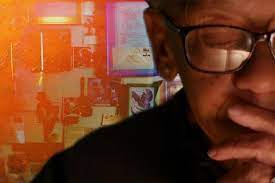170 total views, 1 views today
Going to Mars: The Nikki Giovanni Project 2023 Movie Review
The title of “Going to Mars: The Nikki Giovanni Project” teases galactic possibilities and plays with the notion of the unfinished work. Not the film’s labor — directors Joe Brewster and Michèle Stephenson have crafted an eloquent and engaging portrait — but that of its spiky, brilliant subject. One of the luminaries of the Black Arts Movement of the 1960s into the 1970s, the now 79-year-old Giovanni continues to address the pain and joys, the anger and resilience of the descendants of the Middle Passage, who know much about uncertain and dangerous journeys.
Giovanni was born in Knoxville, TN, in 1943, before moving with her parents and sister to Cincinnati, OH. During the summers as a child, she returned to Tennessee to visit her maternal grandparents. She later attended Fisk University in Nashville and currently lives in Christiansburg, VA, not far from Virginia Tech, where until recently, she was a Distinguished Professor of Writing and English. The recipient of countless awards, she’s in the Ohio Women’s Hall of Fame and was named an Outstanding Woman of Tennessee; a species of bat was named in her honor. And she was a regular on the amazing weekly television series “Soul!,” which for a brief, glimmering moment was to cultural creatives what “Soul Train” would be to music: a call to gather. Among the gems of “Going to Mars” are clips of her and James Baldwin talking it out in 1971; the conversation was later published at “A Dialogue.”
Had the movie touched on all her achievements, it would have become an episodic doc. Thankfully, “Going to Mars” doesn’t default to the conventional in its biographical mission. The filmmakers’ approach reflects a desire to formally honor Giovanni’s poetry (voiced in the doc by executive producer Taraji P. Henson, another of the film’s smart gestures) but also the realities of the writer herself. If space travel is a yearning, aging is a theme. Ailing is a theme. She’s still reckoning — with racism, sexism and other oppressions — and in the case of her adult son, Thomas, she is perhaps reconciling too.
That hedging note is reflective of how the filmmakers and their subject resist tidying up loose ends. At times things a viewer may want to know more about go understated or unsaid. (Giovanni has written two memoirs and her poems are often personal.) When Thomas, his (presumed) partner and daughter Kai arrive at a New York City photo shoot, Giovanni mentions that it’s been a while. That comment is a nod to the pandemic, but does it also hint at an estrangement?
The film is equally tight-lipped yet transparent about Giovanni and her partner Virginia Fowler, who have been together for 30 years. It doesn’t feel like an evasion so much as an intentional resistance to over-explaining, a gesture in keeping with Giovanni’s vocation as a poet. When she speaks at the funeral for an aunt, the last of kin in her mother’s generation, she mentions their relationship, but it’s not a declaration of identity. (As if to support this, in the Sundance program’s numerous tags for “Going to Mars” — i“BIPOC,” “Female Centered Stories” and so on — “LGBTQ+ Stories” is not among them.)
In at least two surprising, revealing instances, Giovanni politely but firmly declines to answer a question put to her. (One occurs at a public gathering when an audience member asks her to recount where she was on the day Martin Luther King Jr. was assassinated.) Each signals a rebuff to reliving personal or national traumas she’s spoken or written of before.
Like 2016’s “I Am Not Your Negro,” Raoul Peck’s film about James Baldwin’s final, unfinished tome, “Going to Mars” responds creatively to the call of its ingenious subject thanks to the directors’ soulful grasp of her work, and Terra Long and Lawrence Jackman’s skillful editing. Greg Harriott’s cinematography delivers clear-eyed close-ups of the poet’s face, but then hints at the ethereal with more cosmic, otherworldly double-exposed images. Plunging into the archival, Brewster and Stephenson consider the fluidity of space and time when it comes to memories — both personal and historic — and the here and now. Composers Samora Pinderhughes and Chris Pattishalls buoy these gestures, as does the sound design. There’s an evocative richness to these visual and aural flights; they seem to emanate from Giovanni’s moments of introspection and reflection.
While she doesn’t board a spaceship, Giovanni does make enough treks that one might winkingly redub the film “Planes, Trains and Automobiles.” She goes to Atlanta for a Q&A with the author Pearl Cleage, whom Giovanni once babysat to events in New York City, West Virginia and Philadelphia. One can spot fellow Black Arts poet Sonia Sanchez in the audience of a Philly event. This documentary arrives at a time of resurgent interest in the Black Arts and Black Pride movements.
In 2021, when NASA named its headquarters after pioneering Black female engineer Mary Jackson, Giovanni participated virtually in the celebration. The space agency tweeted a line from her poem “Quilting the Black-Eyed Pea (We’re Going to Mars”): “The trip to Mars can only be understood through Black Americans.” The poem proves a tonic to the insatiable ambitions of billionaires, and in the film, Giovanni reiterates her yearning for the adventure, even if it means dying in space. In the meantime, it appears she has found her kin among young, pierced, tatted, oh-so bold Afro Punks. At a gathering in Brooklyn, she beams as she poses for selfies with fans who know what going “back to the future” might yield.
“You know, I’m not friendly,” she tells Johnetta Cole at an Apollo Theater event early in the film. She’s something more vital than that. “Going to Mars” shows she’s still on the adventure of living, taking those willing to do the work along for the ride.
